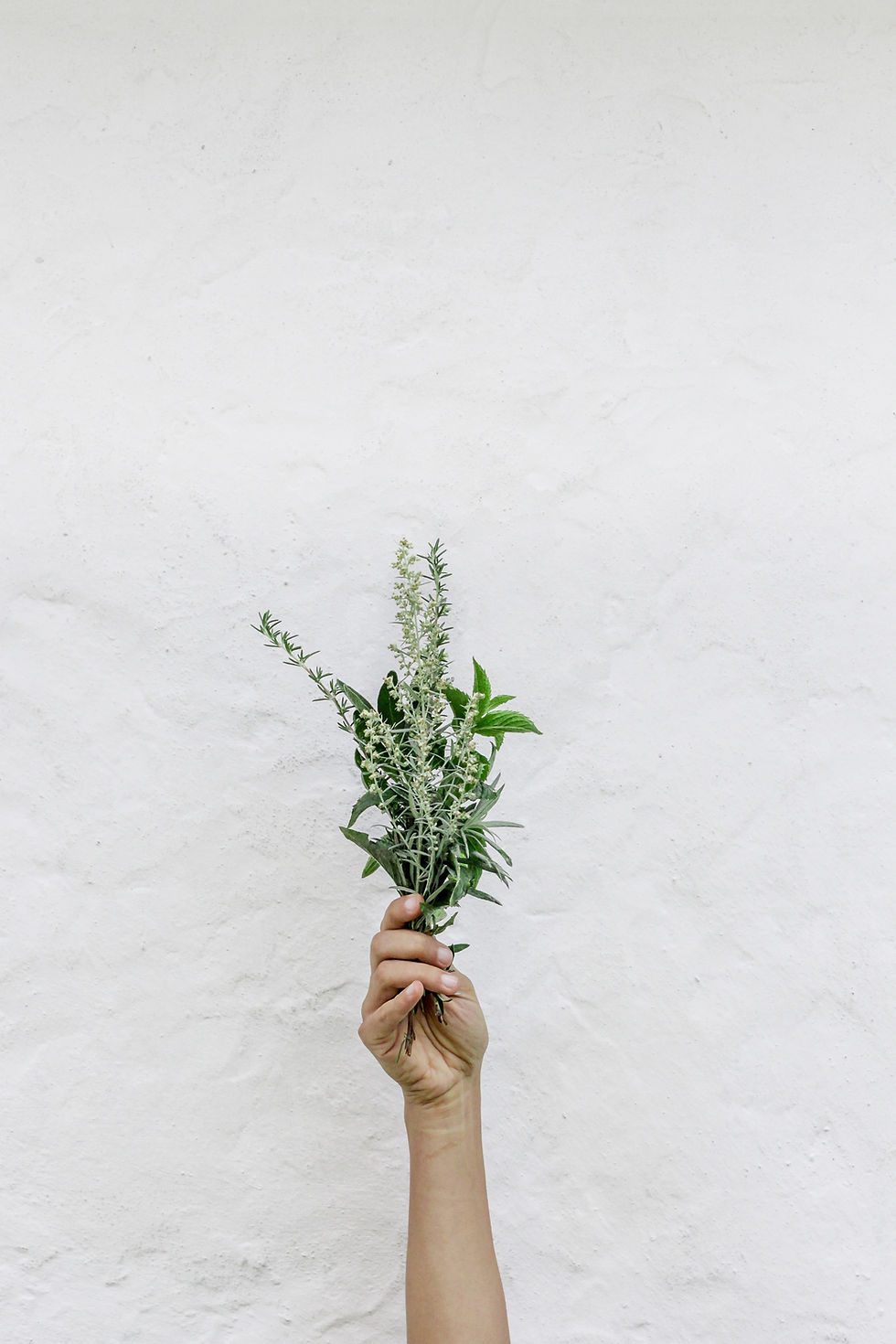Rosemary: A Classic Kitchen Herb with Numerous Benefits
- Alicia Heiser
- Aug 25, 2023
- 4 min read
Updated: 3 days ago
There's good reason for Rosemary being so common in most kitchens. As a great digestive stimulant that is highly aromatic and incredibly delicious, Rosemary is also a lovely ally for colds and flus, aches and pains, and stimulating circulation, especially to the head. For more information about how to work with this herb to combat colds and flus, check out this blog post.
Key Information
Common Name: Rosemary (MRH)
Latin Name: Salvia rosmarinus (previously known as Rosmarinus officinalis)
Family: Lamiaceae
General Characteristics: Evergreen shrub, very aromatic, grows up to 6 ft, narrow, dark green, pinelike leaves
Harvesting Info: Gather branches in Summer after flowering and dry away from the Sun
Precautions: Avoid if you suffer from seizures

Herbal Actions for Rosemary
Analgesic
Anticatarrhal
Anti-depressive
Anti-fungal
Anti-inflammatory
Anti-microbial
Antioxidant
Antirheumatic
Antiseptic
Antispasmodic
Antiviral
Aromatic
Astringent
Cardiotonic
Carminative
Cholagogue
Diaphoretic
Digestive
Diuretic
Emmenagogue
Expectorant
Hepatic
Hypotensive
Immune tonic
Nervine
Parasiticide
Rubefacient
Sedative
Stimulant (circulatory and nervine)
Tonic

Medicinal Ways to Work with Salvia rosmarinus
Rosemary has a particular affinity for the head. As a circulatory stimulant, they improve circulation around the entire body, but Rosemary is particularly indicated for encouraging good circulation to and from our head. For this reason, Rosemary can help improve and strengthen memory, relieve migraines and headaches, and encourage healthy hair growth. For headaches, Rosemary is particularly supportive when they are of an anxious or tense origin. Culpeper writes that this herb “helps a weak memory, and quickens the senses.”
While still considered a warming herb, Salvia rosmarinus is less heating than many other circulatory stimulants. This herb is very supportive of the heart, encourages peripheral circulation and strengthens the capillaries. Rosemary is also great to apply topically, again increasing circulation without bringing too much heat. This can be helpful for promoting the healing of cuts, sprains, swelling, inflammation and arthritis.
As an antirheumatic that also helps ease aching muscles and relieve tension, this herb is particularly indicated for arthritic conditions. She can also ease sciatica and neuralgia and is known to stimulate nerve growth, supportive wherever nerve repair is needed.
Rosemary is well-known for the ways that they support our digestive system, bringing both a toning and calming impact to our guts. They relieve gas and can support the healthy function of both the liver and gallbladder. Rosemary is known especially to be liver protective. In a similar way, Salvia rosmarinus can be helpful for relieving period pain and helping to keep things moving along.

Free Mini-Course: 3 Steps to Safely Work with Herbs
Want to use herbs for yourself and your loved ones, but not sure where to start?
Join our Herbal Confidence Crash Course and learn:
✅ The 3 essential steps to safely and effectively use herbs
✅ How to confidently choose the right herb at the right time
✅ How to build trust in your knowledge and intuition
Perfect for beginners or anyone looking to feel grounded and empowered in their herbal journey.

Herbal Apprentice Program
If you want to learn more incredible herbal remedies and the magic of plants, Artemisia Academy's Herbal Apprentice Program may be perfect for you. This 150-hour program is hands-on, interactive, and will give you the skills and knowledge you need to form deep and healing relationships with the herbal allies all around us.
The information I shared in this post comes from my own relationship with Rosemary, Artemisia Academy’s classes, David Hoffman's Medical Herbalism and Holistic Herbal, Nicholas Culpeper's Complete Herbal, Lucy Jones's A Working Herbal Dispensary, and Andrew Chevallier’s Encyclopedia of Herbal Medicine.
About the Author

Alicia Cielle Heiser is an Astrologer, Herbalist and student at Artemisia Academy. Her work centers on facilitating a greater understanding of the cyclical nature of the world and the ways that we as humans fit within the greater whole. She is writing a series of materia medica blog posts for Artemisia to make the wisdom and knowledge of herbal medicine more available to more people. Alicia also has a podcast called Conversations with the Planets and she offers herbal astrology readings and crafts personalized herbal tea blends. You can find her at www.aliciacielle.com.
Disclaimer: Information presented on this webpage is for educational purposes only, and does not include the diagnosis and treatment of disease nor replace the advice of a licensed physician. Please refer to a licensed health professional for any illness or persistent symptoms before using herbal remedies.
Herbs can sometimes cause discomfort or side effects, and may interact adversely with pharmaceutical medications. Do not use herbs internally without the approval of a doctor or medical professional if you are currently on medications or have a history of medical conditions.
This page contains affiliate links, including through Amazon & Mountain Rose Herbs. If you purchase through these links, we may earn a small commission at no extra cost to you.



Comments